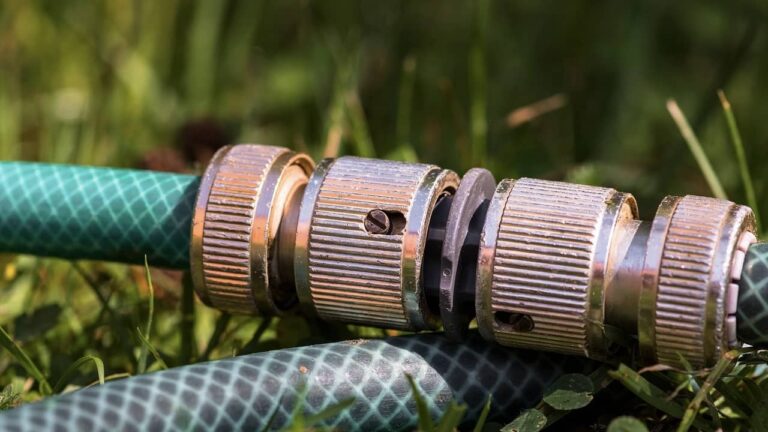
An RV water hose may seem like a pretty simple thing: it’s just the tube connecting you to the city water hookup, ensuring fresh water comes flowing out of your taps, shower head, and toilet. That said, there are also a few things to know about these important pieces of equipment before you set out on your first camping trip.
This post contains affiliate links. RVshare may receive compensation if you make a purchase after clicking on a product link.
Comparing RV Water Hoses
When you’re in the market for a water hose for your RV, make sure that first and foremost you find one that’s specifically made for drinking, or potable, water. Garden hoses are not rated for potable water in the same way RV drinking water hoses are, and they can leech chemicals into your water supply that taste and smell bad — or which can even be toxic!
Once you’ve eliminated garden hoses, you’re left with a variety of different RV fresh water hoses to choose from.
These include:

Different Types of RV Water Hoses
Let’s take a more detailed look at the different kinds of RV hoses.
RV Potable Water Hose
We have already mentioned potable and drinking water hoses as the terms are interchangeable. Often, these hoses are bright white or blue to distinguish them from typical green garden hoses.
Heated RV Water Hose
If you’ll be traveling somewhere where the temperatures dip below freezing, a heated water hose is essential to ensure your water source doesn’t freeze up. If you keep using a regular RV water hose at sub-freezing temperatures, the hose is apt to split when the water inside it freezes, leading to a mess that’s no fun to clean up in chilly temperatures — not to mention a lack of water coming out of your taps!
Heated RV water hoses are well-insulated and come with a heat strip along the side of the hose. That strip is plugged into a standard 110 volt electrical connection to heat it up. The hose stays above freezing thus, so the water in the hose stays above freezing and flows freely into your RV. These are sometimes also called “no-freeze water hoses.”
“No Kink” Hoses
“No-kink” hoses are exactly what you might think, hoses that don’t generally twist, tangle and become kinked. Unfortunately, it is still possible to kink these hoses, so you do still need to be aware of how they are used and stored, but such issues are much less common.
It is possible to find both heated and traditional hoses with the “kink-free” feature.
What to Look For When Buying an RV Water Hose
When shopping for your water hose, there are a few things you’ll want to look for.
- Be sure to look for one that specifically states it’s built for drinking water safety. Green garden hoses are not safe to use for drinking water.
- Ensure you choose the length that works best for your camping needs. Generally, you want the shortest hose possible while still reaching between the RV and the spigot without strain. It is possible to join two hoses together for a longer stretch.
- After that, you’ll want to buy your hose based on whether or not you need a heated hose for northerly travels.
- Think about extra additions like kink-free or tangle-free hoses.
- Some hoses also come with built-in storage devices, like a hose reel, and hose bags are also available to keep your coiled-up hose stored neatly and securely.
In addition to a fresh water hose, you will also need a water pressure regulator in order to connect your camper to water safely.
RV Water Hose: FAQs
Let’s finish out this article about RV water hoses by answering some of your most frequently asked questions about them!
Can I use a garden hose for my RV?
Remember our first rule of thumb above: NO! Your general green garden hose is not safe to drink from. They release heavy metals and other toxic substances into the water that can make us humans sick.
Can I use a drinking hose as a garden hose?
Now, in the other direction, exchanging your garden hose for a drinking hose would work just fine, but a drinking hose is generally going to be more expensive than a garden hose, so it would be a waste if you didn’t need one anyway.
Also, keep in mind that not all garden hose water attachments offer potable water. Even if the hose itself is drinking safe, if the water isn’t, you could be in for trouble!
What is the water pressure (PSI) rating for an RV water hose?
While the water pressure rating for RV water hoses isn’t generally advertised, they’re generally rated for typical home water pressure — about 40 to 70 PSI. However, it’s still a good idea to invest in a water pressure regulator as mentioned above.
What are RV water hoses made out of?
Potable water hoses are made of various food-safe ingredients, such as UV-stabilized polyether-based polyurethane.
Is the water hose lead- or BPA-free?
Potable water hoses must be lead-free to be safe; double-check the label to ensure yours is BPA free (though many on the modern market are).
Happy camping — and stay hydrated out there!

